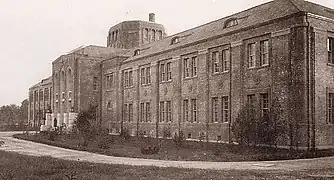North Pyongan Province
평안북도 | |
|---|---|
| Korean transcription(s) | |
| • Chosŏn'gŭl | 평안북도 |
| • Hancha | 平安北道 |
| • McCune-Reischauer | P'yŏng'anbuk-to |
| • Revised Romanization | Pyeong-anbuk-do |
 | |
| Coordinates: 40°06′N 124°24′E / 40.1°N 124.4°E | |
| Country | |
| Region | Kwansŏ |
| Capital | Sinŭiju |
| Subdivisions | 3 cities; 22 counties |
| Government | |
| • Party Committee Chairman | Mun Kyong-dok (WPK) |
| • People's Committee Chairman | Jong Kyong-il[1] |
| Area | |
| • Total | 12,191 km2 (4,707 sq mi) |
| Population (2008) | |
| • Total | 2,728,662 |
| • Density | 220/km2 (580/sq mi) |
| Time zone | UTC+09:00 (Pyongyang Time) |
| Dialect | P'yŏngan |
North Pyongan Province (also spelled North P'yŏngan; Korean: 평안북도; MR: Phyŏnganbukto; IPA: [pʰjʌŋanbuk̚t͈o]) is a western province of North Korea. The province was formed in 1896 from the northern half of the former P'yŏng'an Province, remained a province of Korea until 1945, then became a province of North Korea. Its capital is Sinŭiju. In 2002, Sinŭiju Special Administrative Region—near the city of Sinuiju—was established as a separately governed Special Administrative Region.
Geography
The Yalu River forms the northern border with China's Liaoning province. The province is also bordered to the east by Chagang Province and to the south by South Pyong'an Province. The Sinŭiju Special Administrative Region is located in the western corner of the province, and was created as an administrative entity separate from North Pyongan in 2002. North Pyongan is bounded by water to the west with the Korea Bay and the Yellow Sea.
Administrative divisions
North Pyongan is divided into 3 cities (si) and 22 counties (kun). Each entity is listed below in English, Chosŏn'gŭl, and Hancha.
| Name | Chosŏn'gŭl | Hancha | Population (2008)[2] |
Subdivisions |
|---|---|---|---|---|
| City | ||||
| Chongju | 정주시 | 定州市 | 189,742 | 14 dong, 18 ri |
| Kusong | 구성시 | 龜城市 | 196,515 | 25 dong, 18 ri |
| Sinuiju (capital) | 신의주시 | 新義州市 | 359,341 | 49 dong, 9 ri |
| County | ||||
| Changsong County | 창성군 | 昌城郡 | 26,577 | 1 up, 1 rodongjagu, 15 ri |
| Cholsan County | 철산군 | 鐵山郡 | 85,525 | 1 up, 2 rodongjagu, 25 ri |
| Chonma County | 천마군 | 天摩郡 | 50,462 | 1 up, 20 ri |
| Hyangsan County | 향산군 | 香山郡 | 52,350 | 1 up, 20 ri |
| Kujang County | 구장군 | 球場郡 | 139,337 | 1 up, 5 rodongjagu, 22 ri |
| Kwaksan County | 곽산군 | 郭山郡 | 97,660 | 1 up, 19 ri |
| Nyongbyon County | 녕변군 | 寧邊郡 | 113,852 | 1 up, 1 rodongjagu, 26 ri |
| Pakchon County | 박천군 | 博川郡 | 98,128 | 1 up, 1 rodongjagu, 20 ri |
| Pihyon County | 피현군 | 枇峴郡 | 110,637 | 1 up, 2 rodongjagu, 21 ri |
| Pyoktong County | 벽동군 | 碧潼郡 | 35,601 | 1 up, 19 ri |
| Ryongchon County | 룡천군 | 龍川郡 | 135,634 | 1 up, 3 rodongjagu, 19 ri |
| Sakju County | 삭주군 | 朔州郡 | 159,707 | 1 up, 6 rodongjagu, 18 ri |
| Sindo County | 신도군 | 薪島郡 | 11,810 | 1 up, 2 rodongjagu, 1 ri |
| Sonchon County | 선천군 | 宣川郡 | 126,350 | 1 up, 24 ri |
| Taechon County | 태천군 | 泰川郡 | 108,894 | 1 up, 1 rodongjagu, 21 ri |
| Taegwan County | 대관군 | 大館郡 | 69,565 | 1 up, 22 ri |
| Tongchang County | 동창군 | 東倉郡 | 28,665 | 1 up, 1 rodongjagu, 16 ri |
| Tongrim County | 동림군 | 東林郡 | 104,614 | 1 up, 2 rodongjagu, 20 ri |
| Uiju County | 의주군 | 義州郡 | 110,018 | 1 up, 2 rodongjagu, 17 ri |
| Unjon County | 운전군 | 雲田郡 | 101,130 | 1 up, 25 ri |
| Unsan County | 운산군 | 雲山郡 | 102,928 | 1 up, 1 rodongjagu, 27 ri |
| Yomju County | 염주군 | 鹽州郡 | 113,620 | 1 up, 1 rodongjagu, 22 ri |
Gallery
 North Pyongan Provincial Office during Japanese rule in Korea, administering the Province as Heianhoku-dō
North Pyongan Provincial Office during Japanese rule in Korea, administering the Province as Heianhoku-dō.jpg.webp) A Korean Confucianist temple with offerings in Sinuiju, circa 1909
A Korean Confucianist temple with offerings in Sinuiju, circa 1909 An aerial view of downtown Sinuiju - North Pyongan's capital
An aerial view of downtown Sinuiju - North Pyongan's capital.jpg.webp) The North Korean Coastguard in Sinuiju
The North Korean Coastguard in Sinuiju.jpg.webp) A street in Sinuiju when it was under Japanese control
A street in Sinuiju when it was under Japanese control
References
- ↑ "Organizational Chart of North Korean Leadership" (PDF). Seoul: Political and Military Analysis Division, Intelligence and Analysis Bureau; Ministry of Unification. January 2018. Retrieved 17 October 2018.
- ↑ "DPR Korea 2008 Population Census: National Report" (PDF). Central Bureau of Statistics. 2009. Archived from the original (PDF) on 14 May 2011. Retrieved 25 November 2020.